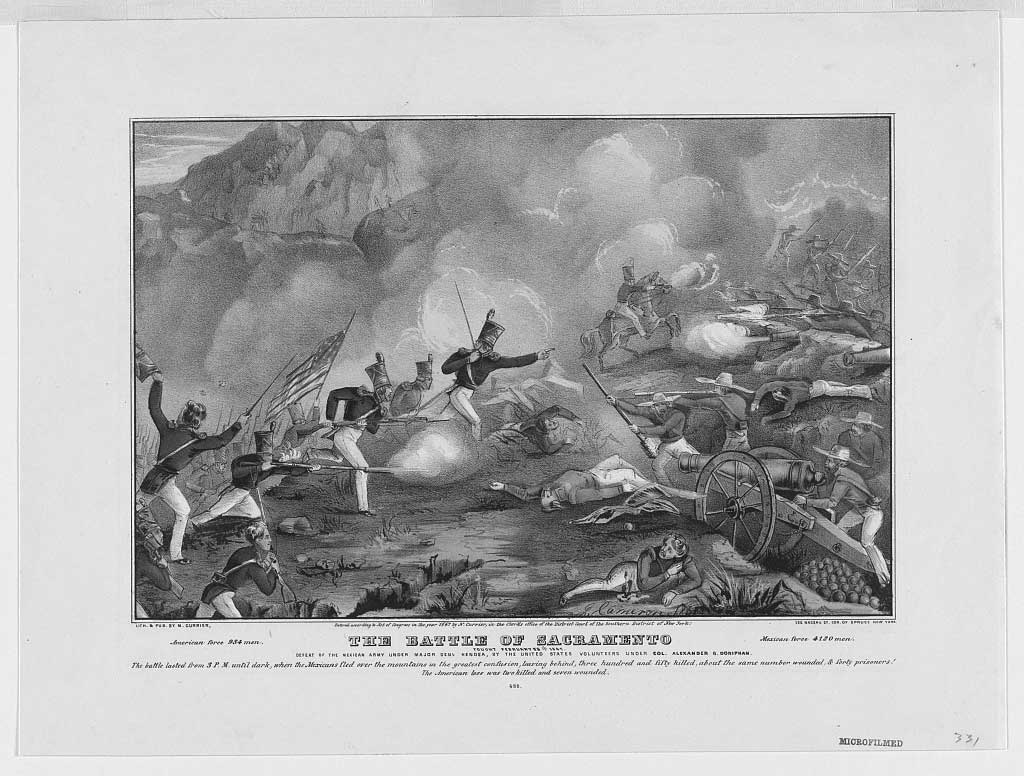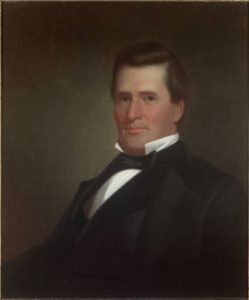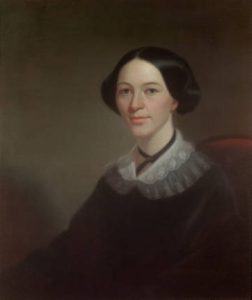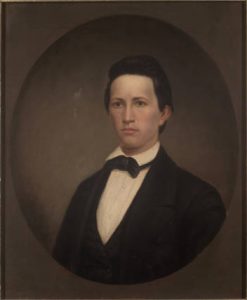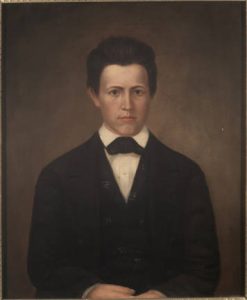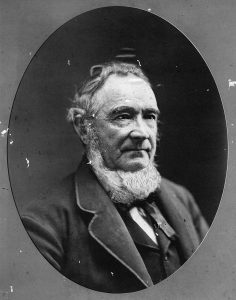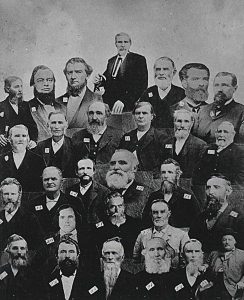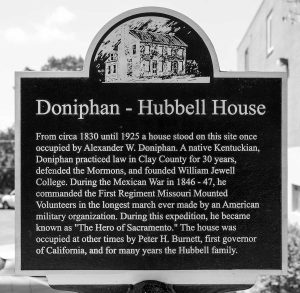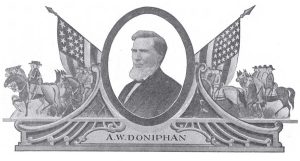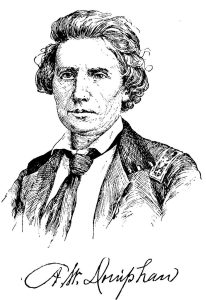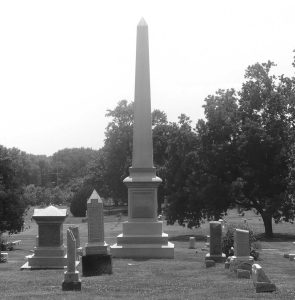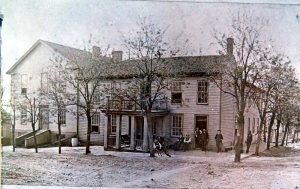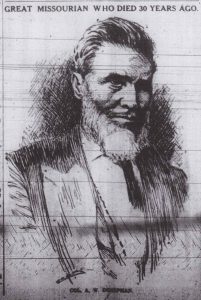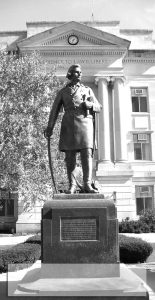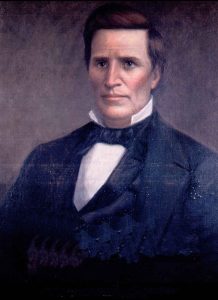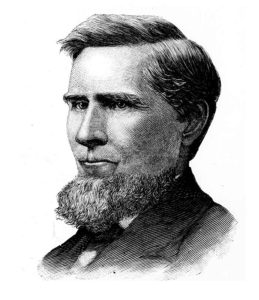About
Alexander W. Doniphan
(1808 - 1887)
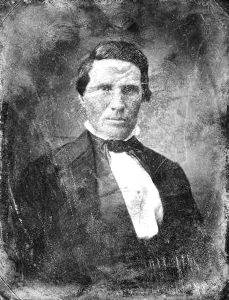 Alexander William Doniphan was born near Maysville in Mason County, Kentucky, on July 9, 1808, and died in Richmond, Ray County, Missouri, on August 8, 1887. He was 79 years of age at his death. Descending from Revolutionary War ancestry, Doniphan graduated from Augusta College in Kentucky in 1827 at age 19. In 1829, after studying law for two years, he was admitted to practice in the courts of Ohio and Kentucky. In 1830 he relocated to Lafayette County, Missouri, where he established a law office. Within a few years, he traveled to Liberty, Clay County, where he became known as a fearless orator in the courts of law.
Alexander William Doniphan was born near Maysville in Mason County, Kentucky, on July 9, 1808, and died in Richmond, Ray County, Missouri, on August 8, 1887. He was 79 years of age at his death. Descending from Revolutionary War ancestry, Doniphan graduated from Augusta College in Kentucky in 1827 at age 19. In 1829, after studying law for two years, he was admitted to practice in the courts of Ohio and Kentucky. In 1830 he relocated to Lafayette County, Missouri, where he established a law office. Within a few years, he traveled to Liberty, Clay County, where he became known as a fearless orator in the courts of law.
Doniphan & “the Mormons”
In 1833, Doniphan, along with three other attorneys, represented the claims of  “Mormon Church” (officially known as The Church of Jesus Christ of Latter-day Saints) members in property disputes with non-Mormons in Jackson County, Missouri. As the conditions between the early Mormon settlers and non-Mormons in Jackson County worsened, Doniphan and the other attorneys played a larger role in representing their Church clients in private mediation, the courts and in petitions for protection to the Governor of Missouri.
“Mormon Church” (officially known as The Church of Jesus Christ of Latter-day Saints) members in property disputes with non-Mormons in Jackson County, Missouri. As the conditions between the early Mormon settlers and non-Mormons in Jackson County worsened, Doniphan and the other attorneys played a larger role in representing their Church clients in private mediation, the courts and in petitions for protection to the Governor of Missouri.
Family & Community Life
In 1837 he married Elizabeth Jane Thornton, a daughter of Colonel John Thornton, one of Clay County’s first settlers. That marriage produced two sons, both of whom died in their youth by separate accidents. During Doniphan’s 30 years in Clay County he was regarded as a leading citizen, giving the best of his abilities to the county’s social and economic development.
Focus on Education
Although a member of the Disciples of Christ Church, he was one of the founders of William Jewell College, a Baptist affiliated school in Liberty, Missouri. Doniphan was a strong supporter of many educational endeavors and his name appears as a trustee of a number of early schools. In 1853, he became the first Clay County School Commissioner.
Preserving Liberty
While serving in the 1836-1837 General Assembly, Doniphan was instrumental in organizing Caldwell and Daviess counties as a home for the Mormons. Less than two years later, his defense of the Mormon settlers in those two counties would lead to heroic actions that saved the lives of the leaders of that Church.
In the fall of 1838, Doniphan, a practicing attorney in Liberty, Missouri, was called to lead a detachment of approximately two hundred Clay County militia, to Caldwell and Daviess counties to assist in settling a dispute between the Mormons and non-Mormons in the area. In what would become known as the Mormon War, then Brigadier General Doniphan was ordered by General Lucas of the State Militia to execute Joseph Smith, Jr., founder of The Church of Jesus Christ of Latter-day Saints, his older brother Hyrum and other Church leaders. He flatly refused the direct order stating that, “It is cold-blooded murder.”
Though his disobedience could have led to his own court martial, that refusal saved the lives of those Mormon leaders. The Church leaders were turned over to civilian authorities, and although Joseph and Hyrum Smith and others were imprisoned over the winter in harsh conditions in the Liberty jail, the charges against them were not proven and the prisoners were eventually allowed to escape and rejoin their families.
Military Service
Doniphan led one of the most famous military expeditions in American history to Old Mexico in 1846-1847. He organized a mounted regiment of Missouri volunteers that formed part of Stephen W. Kearny’s force in his march on Santa Fe. Doniphan’s service during the Mexican-American war was highlighted not only by military victory, but also his administration and the writing of new constitutions for conquered lands. His service during this war is recognized by his inclusion in the Fort Leavenworth Hall of Fame. Following his service in the war,  Doniphan returned to his law practice in Liberty where he grew in reputation as a supporter of business, political and economic growth of the local community and the nation. Like virtually every other similarly situated man in his community at this time, Doniphan was the owner of enslaved people. However, he was a strong Unionist. He was appointed by President Abraham Lincoln to serve as a delegate to the Washington Peace Conference in 1861. In 1862 he moved to St. Louis, where he worked as a lawyer with the Missouri Claims Commission seeking pensions for refugees during the Civil War.
Doniphan returned to his law practice in Liberty where he grew in reputation as a supporter of business, political and economic growth of the local community and the nation. Like virtually every other similarly situated man in his community at this time, Doniphan was the owner of enslaved people. However, he was a strong Unionist. He was appointed by President Abraham Lincoln to serve as a delegate to the Washington Peace Conference in 1861. In 1862 he moved to St. Louis, where he worked as a lawyer with the Missouri Claims Commission seeking pensions for refugees during the Civil War.
The Twilight Years
Following the Civil War he relocated to Richmond, Ray County, Missouri, where he practiced law until his death. Like many others following the war, Doniphan joined in efforts to reconcile and to bring the community back together. He is buried in Liberty, Missouri, beside his wife and two sons. Alexander W. Doniphan’s outstanding characteristics and personal commitments in education, jurisprudence, statesmanship, patriotism and business remain a hallmark of exemplary citizenship. His service to community and nation were feted in his own life and continue to be celebrated today by the awarding of the Alexander W. Doniphan Community Service Award.
Doniphan
Bibliography
- Allen, Dewitt Clinton. A Sketch of the Life and Character of Col. Alexander W. Doniphan. Printed at the Advance office,, 1897.
- “Extermination Order.” The Church of Jesus Christ of Latter-day Saints. Accessed December 31, 2019.
- “Missouri Honors Man Who Refused Order to Kill the Prophet Joseph Smith.” The Church of Jesus Christ of Latter-day Saints. Accessed December 31, 2019.
- “Mormon-Missouri War of 1838.” The Church of Jesus Christ of Latter-day Saints. Accessed December 31, 2019.
- Roger Launius, Alexander William Doniphan Columbia, MO: University of Missouri press, 1997.
When Colonel Doniphan and the survivors of his expedition to Mexico returned to St. Louis in 1847, a lavish reception was held for the hero of Sacramento and his Missouri Volunteers. The barbecue was held in a St. Louis park, with a band providing patriotic music. As a part of that celebration, a newly composed musical score entitled “Colonel Doniphan’s Grand March” made its debut.
This lively march was played again in 1924 at the 25th anniversary of the Alexander Doniphan Chapter of the Daughters of the American Revolution in Liberty. The musical score was then lost until 1999, the 100th anniversary of the Alexander Doniphan Chapter, when a copy was found in the Yale University Library. The march was played again in 2000 at the dedication of the Doniphan home site in Liberty, and, since then, at each presentation of the Alexander W. Doniphan Community Service and Leadership Award.
Ladies and gentlemen, the stirring chords of “Colonel Doniphan’s Grand March.”


